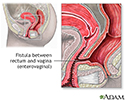Gastrointestinal fistula
Entero-enteral fistula; Enterocutaneous fistula; Fistula - gastrointestinal
A gastrointestinal fistula is an abnormal opening in the stomach or intestines that allows the contents to leak.
- Leaks that go through to a part of the intestines are called entero-enteral fistulas.
- Leaks that go through to the skin are called enterocutaneous fistulas.
- Other organs can be involved, such as the bladder, vagina, anus, and colon.
Causes
Most gastrointestinal fistulas occur after surgery. Other causes include:
- Blockage in the intestine
- Infection
-
Crohn disease
Crohn disease
Crohn disease is a disease where parts of the digestive tract become inflamed. It most often involves the lower end of the small intestine and the be...
 ImageRead Article Now Book Mark Article
ImageRead Article Now Book Mark Article - Radiation to the abdomen (most often given as part of cancer treatment)
- Injury, such as deep wounds from stabbing or gunshot
-
Swallowing caustic substances (such as
lye
)
Lye
Sodium hydroxide is a very strong chemical. It is also known as lye and caustic soda. This article discusses poisoning from touching, breathing in ...
Read Article Now Book Mark Article
Symptoms
Depending on where the leak is, these fistulas may cause diarrhea , and poor absorption of nutrients. Your body may not have as much water and fluids as it needs.
- Some fistulas may have no symptoms.
- Other fistulas cause intestinal contents to leak through an opening in the skin.
Exams and Tests
Tests may include:
-
Barium swallow
to look in the stomach or small bowel
Barium swallow
An upper GI and small bowel series is a set of x-rays taken to examine the esophagus, stomach, and small intestine. Barium enema is a related test....
 ImageRead Article Now Book Mark Article
ImageRead Article Now Book Mark Article -
Barium enema
to look in the colon
Barium enema
Barium enema is a special x-ray of the large intestine, which includes the colon and rectum.
 ImageRead Article Now Book Mark Article
ImageRead Article Now Book Mark Article -
CT scan
of the abdomen to look for fistulas between loops of the intestines or areas of infection
CT scan
A computed tomography (CT) scan is an imaging method that uses x-rays to create pictures of cross-sections of the body. Related tests include:Abdomin...
 ImageRead Article Now Book Mark Article
ImageRead Article Now Book Mark Article - Fistulogram, in which contrast dye is injected into the opening of the skin of a fistula and x-rays are taken
Treatment
Treatments may include:
- Antibiotics
- Immune suppressing medicines if the fistula is a result of Crohn disease
- Surgery to remove the fistula and part of the intestines if the fistula is not healing
- Nutrition through a vein while the fistula heals (in some cases)
Some fistulas close on their own after a few weeks to months.
Outlook (Prognosis)
The outlook depends on the person's overall health and how bad the fistula is. People who are otherwise healthy have a very good chance of recovery.
Possible Complications
Fistulas may result in malnutrition and dehydration, depending on their location in the intestine. They may also cause skin problems and infection.
When to Contact a Medical Professional
Call your health care provider if you have:
- Very bad diarrhea or other major change in bowel habits
- Leakage of fluid from an opening on the abdomen or near the anus, especially if you have recently had abdominal surgery
References
De Prisco G, Celinski S, Spak CW. Abdominal abscesses and gastrointestinal fistuals. In: Feldman M, Friedman LS, Brandt LJ, eds. Sleisenger and Fordtran's Gastrointestinal and Liver Disease . 10th ed. Philadelphia, PA: Elsevier Saunders; 2016:chap 28.
Lichtenstein GR. Inflammatory bowel disease. In: Goldman L, Schafer AI, eds. Goldman's Cecil Medicine . 25th ed. Philadelphia, PA: Elsevier Saunders; 2016:chap 141.
Nandakumar G, Michelassi F. Crohn disease. In: Yeo CJ, ed. Shackleford's Surgery of the Alimentary Tract . 7th ed. Philadelphia, PA: Elsevier Saunders; 2013:chap 71.
-
Digestive system organs - illustration
The digestive system organs in the abdominal cavity include the liver, gallbladder, stomach, small intestine and large intestine.
Digestive system organs
illustration
-
Fistula - illustration
A fistula is an abnormal connection between an organ, vessel, or intestine and another organ, vessel or intestine, or the skin. Fistulas can be thought of as tubes connecting internal tubular structures, such as arteries, veins, or intestine, to one another or to the skin. Fistulas are usually the result of trauma or surgery, but can also result from infection or inflammation.
Fistula
illustration
-
Digestive system organs - illustration
The digestive system organs in the abdominal cavity include the liver, gallbladder, stomach, small intestine and large intestine.
Digestive system organs
illustration
-
Fistula - illustration
A fistula is an abnormal connection between an organ, vessel, or intestine and another organ, vessel or intestine, or the skin. Fistulas can be thought of as tubes connecting internal tubular structures, such as arteries, veins, or intestine, to one another or to the skin. Fistulas are usually the result of trauma or surgery, but can also result from infection or inflammation.
Fistula
illustration
Review Date: 5/11/2016
Reviewed By: Subodh K. Lal, MD, gastroenterologist with Gastrointestinal Specialists of Georgia, Austell, GA. Review provided by VeriMed Healthcare Network. Also reviewed by David Zieve, MD, MHA, Isla Ogilvie, PhD, and the A.D.A.M. Editorial team.



